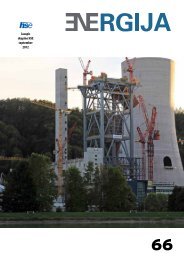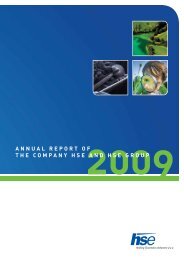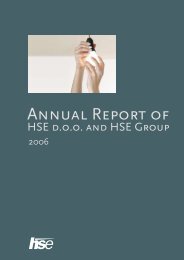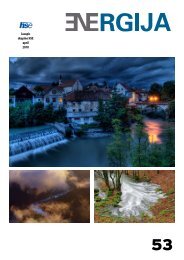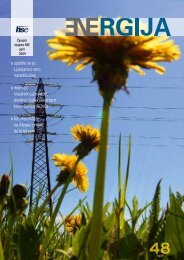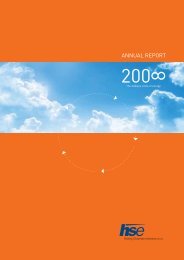Annual report - HSE
Annual report - HSE
Annual report - HSE
You also want an ePaper? Increase the reach of your titles
YUMPU automatically turns print PDFs into web optimized ePapers that Google loves.
National, European and global framework in 2012<br />
The <strong>HSE</strong> Group currently operates in very unstable circumstances, which are not connected<br />
solely to recovering of national economy, but also with outdated national energy strategy<br />
for the following medium and long-term period. Therefore, our activities depend on<br />
adoption of new National Spatial Plan (NSP) that would determine key guidelines and<br />
investments in the Slovenian energy industry until 2030, but the document has not been<br />
prepared yet. Legal arrangement of energy sector will undergo significant changes also<br />
due to new Energy Act. Both relevant documents should have been adopted already in<br />
2011; however, since the adoption was postponed, the <strong>HSE</strong> Group has faced the fact that<br />
more precise time schedules and the scope of certain long-term projects, as well as their<br />
respective acceptability on strategic level, will have to be analysed only after the adoption<br />
of new NSP.<br />
On 28 January 2012, changes and amendments to the current Energy Act (EZ-E) were<br />
adopted, which transposed to the Slovenian national law the directive relating to promotion<br />
of the use of energy from renewable sources, common rules for the internal market in<br />
natural gas, geological storage of carbon dioxide, indication by labelling and standard<br />
product information of the consumption of energy and other resources by energy-related<br />
products, and establishing a framework for the setting of ecodesign requirements for<br />
energy-related products.<br />
In 2012, the adoption of the following measures was expected: the Climate Change Act<br />
and the Strategy for the Transition of Slovenia to a Low Carbon Society by 2050, which<br />
would set ambitious objectives also for the fields of energy, comprising total reduction of<br />
greenhouse gas emissions from the energy sector by 2050 and cancellation of coal import<br />
by 2020. Both documents were submitted for public consultation, but have yet not been<br />
adopted. The discussed issues are supposed to be covered by the new Climate Change<br />
Act.<br />
At the European level, the strategy Europe 2020 continued to be the key reference for<br />
the <strong>HSE</strong>’s operations, as it determines 5 core goals to be achieved by 2020. Two of these<br />
goals that have a direct impact on our operations are: reaching goals 3x20 in the area of<br />
environment and energetics and a 3% EU GDP for research and development. In order to<br />
achieve these goals, the EU established 7 initiatives, among which are ‘Resource Efficient<br />
Europe’ for promotion of transition to low carbon economy, of increased RES utilisation, of<br />
modernisation of the transport sector, and of energy sufficiency, and ‘Innovation Union’ for<br />
improvement of framework conditions and access to finance for research and innovation.<br />
In November 2012, the Energy Efficiency Directive was adopted. The directive provides<br />
general framework for promotion of energy efficiency in the EU. The purpose of proposed<br />
measures, besides closing the gap in reaching the EU’s 20% energy saving target, is to<br />
realise the EU vision for 2050, i.e. to establish a resource efficient and low-carbon economy,<br />
better energy sufficiency and improved reliability of energy supply. The directive became<br />
effective as of 4 December 2012, while the Republic of Slovenia has to transpose it to the<br />
national law by 5 June 2014, supposedly with the new Energy Act (EZ-1).<br />
As at the end of 2012, the United Nations Climate Change Conference took place in Doha,<br />
India. The conference confirmed the extension of the Kyoto Protocol, which is the only<br />
legally binding obligation to reduce emissions of greenhouse gases. The Protocol is<br />
effective until 2020, when it will be replaced with a new agreement, which will be binding<br />
also for developing countries. The agreement is predicted to be ratified in three years.<br />
2.5 Management system policy<br />
2.5.1 Achieving objectives in the area of quality<br />
<strong>Annual</strong> Report <strong>HSE</strong> 2012<br />
2 Business Report<br />
50<br />
Our permanent objectives regarding quality are:<br />
• to meet customer demands;<br />
• to achieve the strategic and tactical business objectives;




